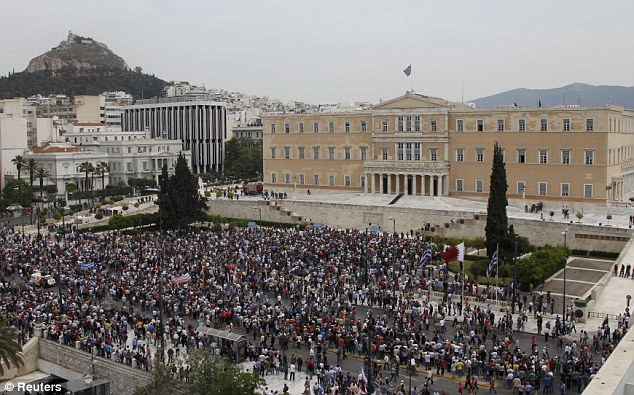Babylon
JF-Expert Member
- Feb 5, 2009
- 1,332
- 82
Moody's credit ratings agency warns Greek debt crisis could spread to UK after three die in battle of Athens
Last updated at 10:57 AM on 6th May 2010
Moody's Investor Service says that although banks in some countries, such as Portugal and Italy, were not heavily affected by the past years' financial crisis, they could be hurt if the fiscal crisis intensifies outside of Greece.
The agency said today that 'a key factor determining whether contagion risk continues in this case will be the market's view of the likely success or otherwise of the recently agreed International Monetary Fund and European Union support package for Greece.'

Tensions explode: A riot policeman is engulfed by flames after being hit by a Molotov cocktail in Athens
Enlarge Onslaught: Missiles litter the street as crowds of rioters, many of them masked, surge up a hill to confront police in the centre of Athens yesterday. At least 18 people were hurt
Onslaught: Missiles litter the street as crowds of rioters, many of them masked, surge up a hill to confront police in the centre of Athens yesterday. At least 18 people were hurt
The Greek parliament is today set to force draconian austerity measures on furious workers in a desperate attempt to secure the multi-billion pound bailout days before the country defaults on its debt.
Three bank workers, one of them pregnant, were killed yesterday as protests by up to 100,000 Greeks against the spending cuts turned deadly.
The deaths were the first during a protest in Greece in nearly 20 years.
On a day of violence in Athens, masked anarchists hurled Molotov cocktails and paving stones at police and smashed shopfronts.
 Running from the mob: A policeman flees protesters in the northern city of Thessaloniki
Running from the mob: A policeman flees protesters in the northern city of Thessaloniki
Others tried repeatedly to storm parliament, chanting 'thieves, traitors'.
They are desperate to defeat the package of austerity measures aimed at saving the country from bankruptcy on which the parliament will vote today.
Greece faces a May 19 due date on debt it says it can't repay without the help.
'DEFICIENT' RATINGS AGENCIES UNDER FIRE
Credit ratings agencies such as Moody's and Standard & Poor's have been criticised by European leaders for their negative outlook on Europe.
The president of the European Commission attacked what he called the deficient work of credit rating agencies, saying they let the dark mood in financial markets cloud their judgement.
Jose Manuel Barroso's remarks, the harshest such criticism from the powerful EU executive, come amid growing frustration among senior officials with rating agencies for downgrading Greece as it teetered on the edge of financial collapse.
Barroso's remarks followed a stark warning earlier in the week from Michel Barnier, the European commissioner in charge of an overhaul of financial services, and further boosted the chances of tougher European controls of the sector.
Germany, also, has called for Europe to set up its own ratings agency to counter the negative reports.
The head of the European law-making executive signalled that further controls could be introduced for the industry.
These would go beyond new rules that start later this year which require the agencies to explain how they arrive at the ratings that can determine a country's financial survival.
Earlier in the week, Barnier had warned credit rating agencies to watch their step when judging a country's financial health, saying the commission would probe how they work and could even set up a central agency to take on their job.
Barnier signalled his dissatisfaction that just three companies -- Standard & Poor's, Moody's and Fitch -- dominate the industry.
Rating agencies had been blamed for carelessness in the run up to the global crash, handing out over-generous ratings on the packets of mortgage and consumer debt that subsequently unravelled, sending the economy into a spin.
The new government cutbacks, which slash salaries and pensions for civil servants and hike consumer taxes, are being imposed as condition of getting a £95billion (110billion euro) package of rescue loans from the International Monetary Fund and the other 15 European Union countries that use the euro as their currency.
Deputies were debating the measures today and were to vote on passing the draft bill tonight.
Prime Minister George Papandreou's Socialists hold a comfortable majority of 160 deputies in the 300-seat Parliament, and the bill is expected to pass easily.
World stocks plunged in early trading today amid fears even the draconian measures will not be enough.
In early trading in Europe, the FTSE 100 index of leading British shares was down 0.5 per cent while France's CAC-40 dropped 1 per cent and Germany's DAX slipped 0.4 per cent. Stock futures pointed to modest losses today on Wall Street.
Asian stocks were slipping even further today.
The euro was also falling in early trading, battered by fears that the financial crisis that has enveloped Greece spread. The euro has dropped to lows last seen in early 2009.
Many Greeks realize some cutbacks are necessary to pull their country back from the brink of default, and reaction until now had been relatively muted by Greece's volatile standards.
But with people beginning to feel the pain of austerity measures, anger boiled over yesterday.
Even so, the deaths of the bank workers shocked the nation.
'I have difficulty in finding the words to express my distress and outrage,' President Karolos Papoulias said late last night.
'Our country came to the brink of the abyss. It is our collective responsibility to ensure that we don't step over the edge.'
Riot police responded to protesters with stun grenades, flash bombs and volleys of tear gas that left clouds of smoke wafting over the capital.
There were also riots in the northern city of Thessaloniki, amid a 24-hour national strike which saw flights grounded, trains and ferries suspended and public services paralysed.
In the most horrific incident, 20 terrified staff were trapped in the burning Marfin bank after it was firebombed by protesters. The mob blocked firefighters from getting to the blaze.
Two women and a man suffocated in the smoke as they tried to escape the flames. Bank officials told reporters one woman had been pregnant.
A fire department official said their lives could have been saved had ' crucial minutes' not been lost getting through the rioters' blockades.
Other staff, some with blackened faces, waited for rescue at windows and on balconies. Firemen had to restrain a distraught elderly woman outside the bank, who wept and cried 'my child, my child'.
Mr Papandreou expressed shock at the deaths and vowed to bring those responsible to justice. 'We are deeply shocked by the unjust death of these three people, our fellow citizens, who were victims of a murderous act,' he said.
But he insisted the government would not abandon its drive to save the country from ruin. 'We took these decisions to save the country,' he said. 'The alternative would be bankruptcy.'
Several other buildings were also set alight during extensive clashes across a broad swathe of central Athens.

Two employees, covered in black from the smoke, cry out in terror from the top floor of the Marfin Egnatia Bank where they were trapped
 Smoke pours from the bank as the two trapped women peer desperately down from the balcony
Smoke pours from the bank as the two trapped women peer desperately down from the balcony
They included the finance ministry in charge of the austerity programme.
The protests came amid a 24-hour nationwide general strike that grounded all flights to and from Greece, shut down ports, schools and government services and left hospitals working with emergency medical staff.
The Acropolis and all other ancient sites were closed, while journalists also walked off the job, suspending television and radio news broadcasts.
 Under attack: Riot police react to a Molotov cocktail as it explodes on a bridge during the demonstrations
Under attack: Riot police react to a Molotov cocktail as it explodes on a bridge during the demonstrations

Scene of horror: Riot police in front of the burnt-out Marfin Egnatia Bank, where three people died after it was set ablaze during the massive demonstration
Police said 18 people had been injured and 12 arrested for carrying weapons and resisting authorities.
Last night there were fears that the violence could continue for at least another day.
Greece has seen its borrowing costs on the international market soar to unsustainably high levels, reaching interest rates of above 10 per cent - four times those of Germany's.
Without the eurozone and IMF rescue package - under which Athens will receive loans at interest rates of about 5 per cent - the country will be unable to refinance its debt.
 'Murder': A medic prepares to remove the body of a woman who perished in the bank fire
'Murder': A medic prepares to remove the body of a woman who perished in the bank fire
However, there are fears that the bailout won't stop the debt crisis from spreading to other financially troubled EU countries like Portugal and Spain. Yesterday, credit ratings agency Moody's put Portugal on watch for a possible downgrade.
In Germany, Chancellor Angela Merkel urged parliament to quickly pass her country's share of the bailout, warning that 'nothing less than the future of Europe' was at stake.
European Council president Herman van Rompuy said last night: 'We are all concerned by the Greek economic and budgetary situation but at this moment our thoughts are with the human victims in Athens.'
 Rising up: Demonstrators massing in Syntagma Square in front of the Greek parliament in Athens
Rising up: Demonstrators massing in Syntagma Square in front of the Greek parliament in Athens
Last updated at 10:57 AM on 6th May 2010
- Greek parliament set to pass austerity measures today
- World stocks plunge and euro weakens again today after Greek deaths
Moody's Investor Service says that although banks in some countries, such as Portugal and Italy, were not heavily affected by the past years' financial crisis, they could be hurt if the fiscal crisis intensifies outside of Greece.
The agency said today that 'a key factor determining whether contagion risk continues in this case will be the market's view of the likely success or otherwise of the recently agreed International Monetary Fund and European Union support package for Greece.'
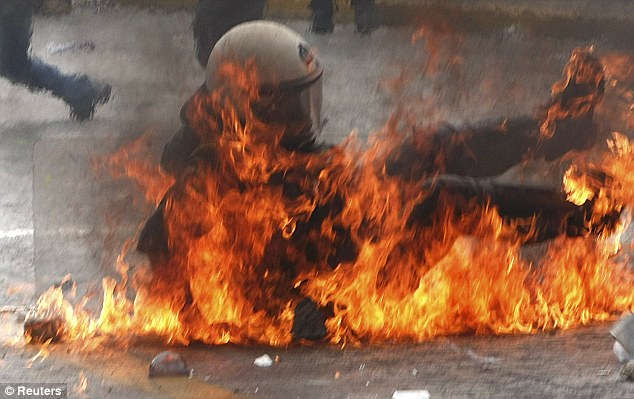
Tensions explode: A riot policeman is engulfed by flames after being hit by a Molotov cocktail in Athens
Enlarge
 Onslaught: Missiles litter the street as crowds of rioters, many of them masked, surge up a hill to confront police in the centre of Athens yesterday. At least 18 people were hurt
Onslaught: Missiles litter the street as crowds of rioters, many of them masked, surge up a hill to confront police in the centre of Athens yesterday. At least 18 people were hurtThe Greek parliament is today set to force draconian austerity measures on furious workers in a desperate attempt to secure the multi-billion pound bailout days before the country defaults on its debt.
Three bank workers, one of them pregnant, were killed yesterday as protests by up to 100,000 Greeks against the spending cuts turned deadly.
The deaths were the first during a protest in Greece in nearly 20 years.
On a day of violence in Athens, masked anarchists hurled Molotov cocktails and paving stones at police and smashed shopfronts.
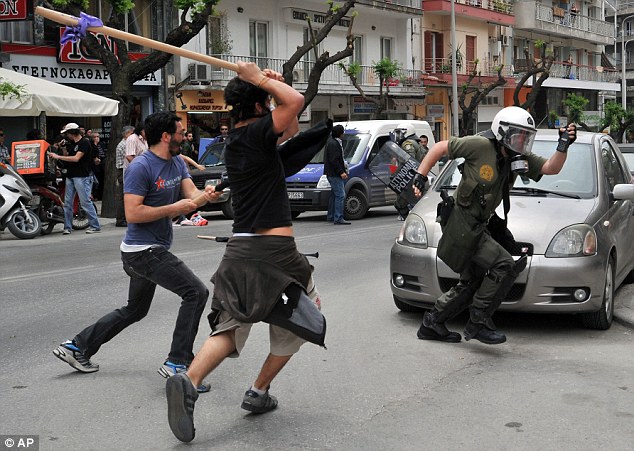
Others tried repeatedly to storm parliament, chanting 'thieves, traitors'.
They are desperate to defeat the package of austerity measures aimed at saving the country from bankruptcy on which the parliament will vote today.
Greece faces a May 19 due date on debt it says it can't repay without the help.
'DEFICIENT' RATINGS AGENCIES UNDER FIRE
Credit ratings agencies such as Moody's and Standard & Poor's have been criticised by European leaders for their negative outlook on Europe.
The president of the European Commission attacked what he called the deficient work of credit rating agencies, saying they let the dark mood in financial markets cloud their judgement.
Jose Manuel Barroso's remarks, the harshest such criticism from the powerful EU executive, come amid growing frustration among senior officials with rating agencies for downgrading Greece as it teetered on the edge of financial collapse.
Barroso's remarks followed a stark warning earlier in the week from Michel Barnier, the European commissioner in charge of an overhaul of financial services, and further boosted the chances of tougher European controls of the sector.
Germany, also, has called for Europe to set up its own ratings agency to counter the negative reports.
The head of the European law-making executive signalled that further controls could be introduced for the industry.
These would go beyond new rules that start later this year which require the agencies to explain how they arrive at the ratings that can determine a country's financial survival.
Earlier in the week, Barnier had warned credit rating agencies to watch their step when judging a country's financial health, saying the commission would probe how they work and could even set up a central agency to take on their job.
Barnier signalled his dissatisfaction that just three companies -- Standard & Poor's, Moody's and Fitch -- dominate the industry.
Rating agencies had been blamed for carelessness in the run up to the global crash, handing out over-generous ratings on the packets of mortgage and consumer debt that subsequently unravelled, sending the economy into a spin.
The new government cutbacks, which slash salaries and pensions for civil servants and hike consumer taxes, are being imposed as condition of getting a £95billion (110billion euro) package of rescue loans from the International Monetary Fund and the other 15 European Union countries that use the euro as their currency.
Deputies were debating the measures today and were to vote on passing the draft bill tonight.
Prime Minister George Papandreou's Socialists hold a comfortable majority of 160 deputies in the 300-seat Parliament, and the bill is expected to pass easily.
World stocks plunged in early trading today amid fears even the draconian measures will not be enough.
In early trading in Europe, the FTSE 100 index of leading British shares was down 0.5 per cent while France's CAC-40 dropped 1 per cent and Germany's DAX slipped 0.4 per cent. Stock futures pointed to modest losses today on Wall Street.
Asian stocks were slipping even further today.
The euro was also falling in early trading, battered by fears that the financial crisis that has enveloped Greece spread. The euro has dropped to lows last seen in early 2009.
Many Greeks realize some cutbacks are necessary to pull their country back from the brink of default, and reaction until now had been relatively muted by Greece's volatile standards.
But with people beginning to feel the pain of austerity measures, anger boiled over yesterday.
Even so, the deaths of the bank workers shocked the nation.
'I have difficulty in finding the words to express my distress and outrage,' President Karolos Papoulias said late last night.
'Our country came to the brink of the abyss. It is our collective responsibility to ensure that we don't step over the edge.'
Riot police responded to protesters with stun grenades, flash bombs and volleys of tear gas that left clouds of smoke wafting over the capital.
There were also riots in the northern city of Thessaloniki, amid a 24-hour national strike which saw flights grounded, trains and ferries suspended and public services paralysed.
In the most horrific incident, 20 terrified staff were trapped in the burning Marfin bank after it was firebombed by protesters. The mob blocked firefighters from getting to the blaze.
Two women and a man suffocated in the smoke as they tried to escape the flames. Bank officials told reporters one woman had been pregnant.
A fire department official said their lives could have been saved had ' crucial minutes' not been lost getting through the rioters' blockades.
Other staff, some with blackened faces, waited for rescue at windows and on balconies. Firemen had to restrain a distraught elderly woman outside the bank, who wept and cried 'my child, my child'.
Mr Papandreou expressed shock at the deaths and vowed to bring those responsible to justice. 'We are deeply shocked by the unjust death of these three people, our fellow citizens, who were victims of a murderous act,' he said.
But he insisted the government would not abandon its drive to save the country from ruin. 'We took these decisions to save the country,' he said. 'The alternative would be bankruptcy.'
Several other buildings were also set alight during extensive clashes across a broad swathe of central Athens.
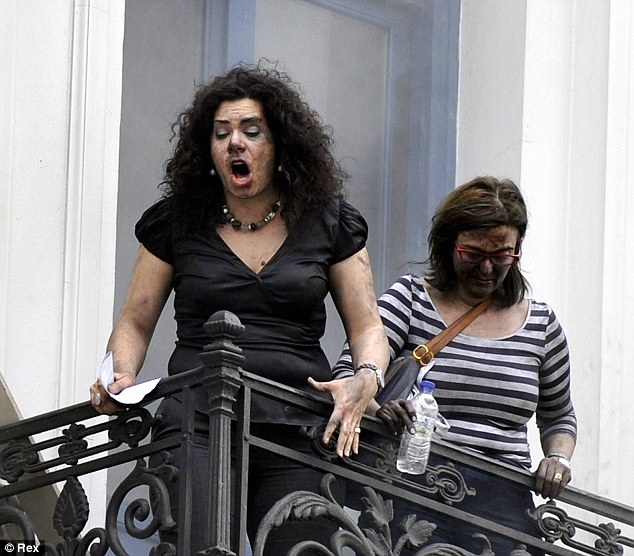
Two employees, covered in black from the smoke, cry out in terror from the top floor of the Marfin Egnatia Bank where they were trapped
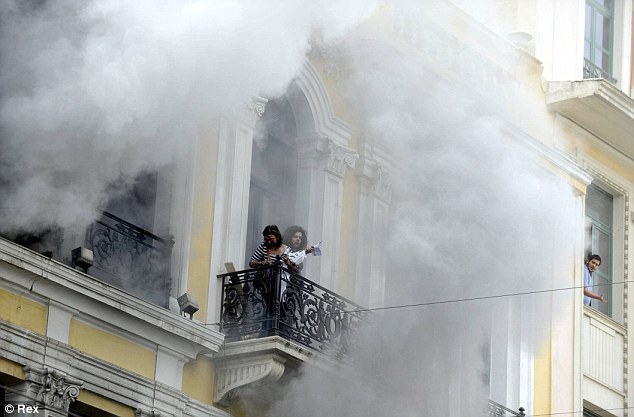
They included the finance ministry in charge of the austerity programme.
The protests came amid a 24-hour nationwide general strike that grounded all flights to and from Greece, shut down ports, schools and government services and left hospitals working with emergency medical staff.
The Acropolis and all other ancient sites were closed, while journalists also walked off the job, suspending television and radio news broadcasts.
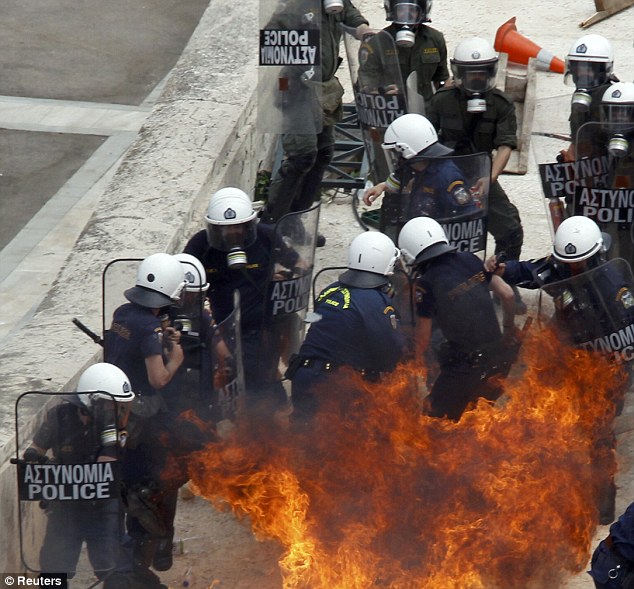
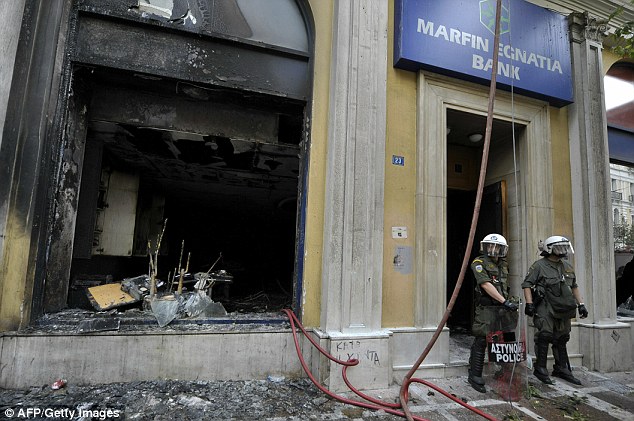
Scene of horror: Riot police in front of the burnt-out Marfin Egnatia Bank, where three people died after it was set ablaze during the massive demonstration
Police said 18 people had been injured and 12 arrested for carrying weapons and resisting authorities.
Last night there were fears that the violence could continue for at least another day.
Greece has seen its borrowing costs on the international market soar to unsustainably high levels, reaching interest rates of above 10 per cent - four times those of Germany's.
Without the eurozone and IMF rescue package - under which Athens will receive loans at interest rates of about 5 per cent - the country will be unable to refinance its debt.
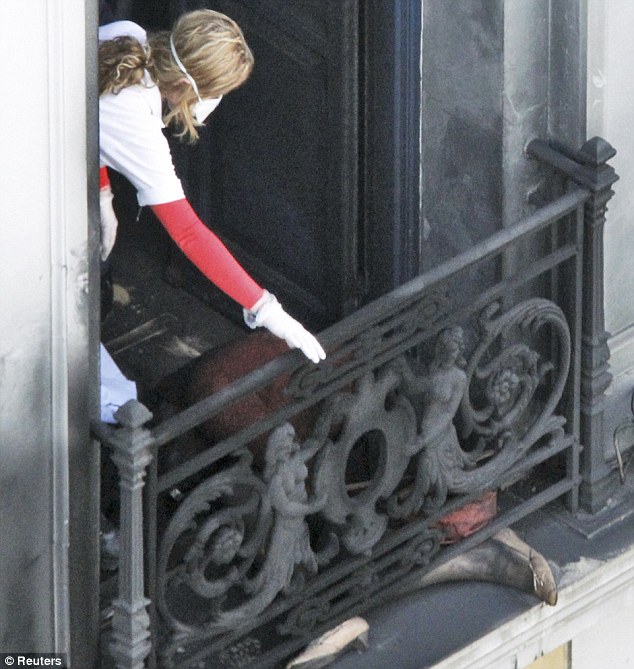
However, there are fears that the bailout won't stop the debt crisis from spreading to other financially troubled EU countries like Portugal and Spain. Yesterday, credit ratings agency Moody's put Portugal on watch for a possible downgrade.
In Germany, Chancellor Angela Merkel urged parliament to quickly pass her country's share of the bailout, warning that 'nothing less than the future of Europe' was at stake.
European Council president Herman van Rompuy said last night: 'We are all concerned by the Greek economic and budgetary situation but at this moment our thoughts are with the human victims in Athens.'
